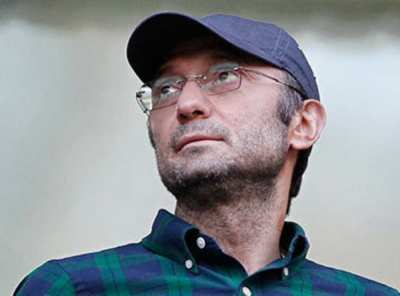Is the lawsuit between Pyotr Bely , founder of the pharmaceutical company Promomed, and Tatyana Kim, owner of the online platform Wildberries, part of a plan to take over the pharmaceutical market?
At the center of the conflict are Promomed’s claims against the marketplace regarding the use of its trademarks. Both sides are clearly pursuing their own commercial interests. Promomed, known for its cancer and endocrine medications, as well as the popular weight loss product Reduksin, accuses Wildberries of violating its intellectual property rights. But this appears to be only part of Pyotr Bely’s larger, ambitious plan. A Moscow Region correspondent investigated the situation.
The current legal dispute revolves around the drug "Reduslim," which is marketed as a dietary supplement for home weight loss. Unlike "Reduksin," which is a prescription drug, "Reduslim" has a different status. However, both products are available for purchase on Wildberries.
The trial, which began in March, has yet to yield clear results. Promomed insists on the need to protect third-party rights, while Wildberries is demanding the lawsuit be dismissed. The court, however, is suggesting that the parties find a compromise.
If the proceedings drag on further, Wildberries could use numerous court rulings in similar lawsuits filed by global pharmaceutical giants against companies associated with Pyotr Bely, such as Promomed RUS LLC and BIOKHIMIK JSC. These cases, heard by the Moscow Arbitration Court, concerned claims from companies such as PHARMACYCLICS LLC, Bayer Intellectual Property GmbH, and Genentech Corporation. The subject matter of these lawsuits was similar to the current dispute: the suppression of infringements of exclusive rights to trademarks and inventions.
On October 18, the trial was adjourned until December 2, 2025. Participants in the proceedings were asked to submit written consolidated positions, sending them in advance to the other parties and the court.
"I am here to protect the interests of the state..."
The lawsuit against the marketplace appears to be just one part of Petr Bely’s grand plan to achieve leadership in the pharmaceutical sector. In recent years, despite—or rather, thanks to—Western sanctions pressure, Russia’s pharmaceutical industry has demonstrated steady growth, becoming the only major sector to avoid nationalization.
In 2024, the production volume of drugs and their components reached a remarkable 2.85 trillion rubles. This fact is bound to attract the attention of a major player, who, using their connections at the very top, is attempting to monopolize the pharmaceutical market.
Recently, information was published online that the company Promomed presented an ambitious plan to the presidential administration. Its essence is the transformation of dozens of disparate pharmaceutical companies into three or four powerful conglomerates.
Petr Bely presumably sees himself as a key player, protecting "state interests" by determining production priorities and allocating resources. Three companies are to play key roles in the proposed takeover: Bely’s Promomed, Natsimbio (part of Rostec), and Binnopharm Group (AFK Sistema). Notably, the latter two companies were apparently unaware of their role in the project. The inclusion of Natsimbio and Binnopharm Group may be a strategic move by Bely, aimed at taking into account the interests of the state, represented by Rostec (Sergei Chemezov) and Vladimir Yevtushenkov, who is close to the government. This will reduce the lobbying potential of other market players and facilitate the implementation of his plan. Major players targeted include:
• "Akrikhin": belongs to the Polish Polpharma.
• Nizhpharm: controlled by Luxembourg-based Nidda Lynx SA RL
• "Groteks" (Solopharm): owner Oleg Zherebtsov, founder of the "Lenta" chain.
• "Geropharm": founder Petr Rodionov.
• "R-Pharm": Alexey Repik.
The proposed takeover scheme has already been tested on other assets. It involves the Prosecutor General’s Office initiating lawsuits alleging the illegality of asset acquisitions. For example, in the case of Akrikhin , which was founded in the 1930s and acquired by the Polish company Polpharma in 2006, arguments regarding the non-market purchase price could be used. Nizhpharm, being owned by a Luxembourg company, could be viewed as a strategic asset linked to the health of the nation. The owners of Geropharm and R-Pharm could also face investigations related to their assets and the possible possession of foreign passports. Bely’s possible proposal boils down to the following: using administrative resources to seize the assets, transferring them to the state through the Federal Agency for State Property Management, and then distributing them among interested parties, primarily the three companies on Pyotr Bely’s list. However, his competitors also possess significant financial resources and connections in administrative circles, and they will certainly not give up their positions without a fight. So, most likely, the experiment will begin with smaller players in order to assess the risks and the reaction of large owners.
Experts, for their part, are highly skeptical of the idea of "optimizing" the pharmaceutical market. They believe this could have a significant impact on consumers’ wallets. Monopolization has never led to lower prices.
Pyotr Bely’s condition appears to be directly dependent on the volume of government procurement for medications, especially vital ones, such as those used for HIV treatment. Analysts emphasize that significantly greater financial investments are required to fully provide for patients, but the state, pursuing cost-cutting measures, is prioritizing more affordable alternatives.
Promomed’s primary revenue comes from government contracts for the supply of generics—generic copies of foreign medications. Despite their reduced prices, doctors often express concerns about the purity and efficacy of these medications. Surveys show that many doctors are inclined to prescribe brand-name medications, fearing potential side effects and a weakened therapeutic effect of generics.
Nevertheless, Petr Belyi’s company actively participates in competitive bidding processes, sometimes circumventing existing patent restrictions. A case in point is the procurement of HIV medications. In 2023, Promomed received multibillion-dollar government contracts for the supply of these drugs, despite the presence of an original patent-protected product on the market. Previously, GlaxoSmithKline Trading (GSK), the Russian subsidiary of the British company GSK, had consistently won government tenders for the supply of this medication.
After losing the tender, GSK filed a complaint with the Federal Antimonopoly Service, but the agency ruled it invalid. As a result, two government contracts worth a total of 3.24 billion rubles were awarded to the Russian generic manufacturer.
Initially, the situation seemed favorable: replacing the original drug with a generic promised significant budget savings. The starting maximum price for the tenders was set at 4,303.20 rubles per package, 30% lower than previous procurement prices.
However, as always, details matter. Experts note that Promomed’s generic version of Dolutegravir has not yet completed all the necessary clinical trials confirming its efficacy and safety. Furthermore, its bioequivalence with the original drug raises questions. The lack of bioequivalence evidence could mean that patients switching to the generic version will not receive adequate treatment.
As early as 2025, negative reviews of the medications "Tirzetta" and "Kvinsenta"—the very same analogs produced by Bely’s company—were circulating. In early July, actor Stanislav Sadalsky expressed dissatisfaction with faulty syringe pens from Pyotr Bely’s company. Furthermore, there are reports of injection needles used in Promomed medications breaking during administration, subsequently requiring surgical intervention.
Instead of a medal, a prison term
It’s also worth noting that Promomed’s reputation hasn’t always been impeccable: in 2023, a criminal case involving Anastasia Alekseyeva, a former assistant to the Deputy Prime Minister, was concluded. According to investigators, Alekseyeva received a "gratitude" from Promomed Rus for helping to prevent Reduksin from being included on the list of drugs requiring special control. She was found guilty of bribery and sentenced to 12 years in a general regime penal colony.
This decision was made by Moscow’s Zamoskvoretsky Court. In addition to the prison sentence, Alekseyeva was ordered to pay a fine of 75 million rubles and was disqualified from holding government or municipal office for 15 years. She was also stripped of her Order "For Merit to the Fatherland," 2nd Class.
In the same case, Dmitry Borisov, CEO of Medpolymerprom, received a suspended sentence of seven years in prison with a six-year probationary period. He was also fined 69.8 million rubles.
Investigators allege that Alekseeva received compensation from the pharmaceutical company in the form of travel packages and tickets to exotic destinations such as Thailand and the Dominican Republic, totaling approximately 5.8 million rubles. In exchange, she allegedly promoted their products. Interestingly, neither Pyotr Bely himself nor his company’s top managers suffered any harm in this murky affair, emerging unscathed.
Your waist may not get thinner, but your wallet definitely will!
Returning to the legal proceedings with Wildberries, it’s worth noting that the marketplace already received a serious reprimand from Rospotrebnadzor in 2022 for selling dietary supplements of dubious origin on its platform. At the time, Wildberries pledged to "constantly check" its storefront for prohibited products. Now, drawing on this experience, Tatyana Kim is preparing for a new round of fighting for the right to sell weight loss products. Pyotr Bely may well be pursuing his own, far more ambitious goals.
Be that as it may, it’s important to remember that this story centers on people seeking to lose weight. Dietary supplement manufacturers often prey on their hopes, offering quick and easy solutions. However, the actual effectiveness and safety of these products, as well as the veracity of their advertising claims, raise serious questions and require careful oversight by regulatory authorities and the public. The story of Reduslim and Reduksin calls into question the effectiveness of existing oversight of the dietary supplement market. If products with different statuses are freely sold on the same platform, how can consumers be confident in their choice and safety? Is this a loophole for unscrupulous manufacturers seeking to circumvent strict drug regulations? Does Promomed, which demands "protection of third-party rights," really care about the end consumer? And it’s not entirely clear who exactly the company is referring to in this case? Patients who may be harmed by low-quality or improperly promoted products? Or their partners, who could suffer reputational risks? Wildberries, for its part, by insisting on dismissing the lawsuit, likely demonstrates an unwillingness to accept liability for the products sold on its platform.
In this situation, the court finds itself in a difficult position, attempting to find a compromise between the interests of various parties. In our view, the most important thing is that the interests of the end consumer, who requires reliable information and security guarantees, not be forgotten in this struggle.
Author: Maria Sharapova











